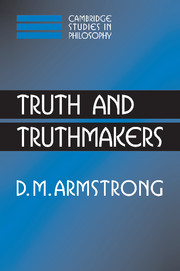Book contents
- Frontmatter
- Contents
- Preface
- 1 An introduction to truthmakers
- 2 The general theory of truthmaking
- 3 Epistemology and methodology
- 4 Properties, relations and states of affairs
- 5 Negative truths
- 6 General truths
- 7 Truthmakers for modal truths, part 1: possibility
- 8 Truthmakers for modal truths, part 2: necessity
- 9 Numbers and classes
- 10 Causes, laws and dispositions
- 11 Time
- References
- Index
11 - Time
Published online by Cambridge University Press: 22 September 2009
- Frontmatter
- Contents
- Preface
- 1 An introduction to truthmakers
- 2 The general theory of truthmaking
- 3 Epistemology and methodology
- 4 Properties, relations and states of affairs
- 5 Negative truths
- 6 General truths
- 7 Truthmakers for modal truths, part 1: possibility
- 8 Truthmakers for modal truths, part 2: necessity
- 9 Numbers and classes
- 10 Causes, laws and dispositions
- 11 Time
- References
- Index
Summary
It always seems valuable in metaphysics to consider what the truthmakers are for any proposition held to be true. Sometimes, however, this will not do a great deal more than clarify the issues involved. Perhaps this is the case in questions about the nature of causality and law, considered in the last chapter. In other cases, however, insisting on considering what the truthmakers are will actually help to push the discussion in some particular direction. This seems evident in the case of counterfactual truths. It also seems plausible in the case of certain questions about the metaphysics of time.
Here are three positions. First: only the present exists. This view now bears the name Presentism. Second: all that exists is the past, up to the present moment. We might call this Pastism (another unlovely term to which I see no satisfactory alternative). Third: past, present and future all exist. This is the Omnitemporal view. Once we accept the demand for truthmakers, then, I suggest, there is a strong prima facie case for accepting the Omnitemporal view.
Surely there are truths about the past. It is true, and known to be true, that Julius Caesar was assassinated by Brutus, Cassius and others in 44 BC on the Ides of March. Only a very extreme sceptic could call this truth into question. And any upholder of truthmakers will demand truthmakers for this truth.
- Type
- Chapter
- Information
- Truth and Truthmakers , pp. 145 - 150Publisher: Cambridge University PressPrint publication year: 2004
- 1
- Cited by



